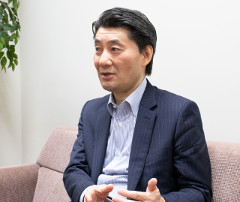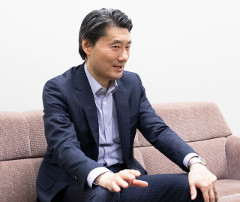Local governments can lawfully act against national policies in their diplomatic activities when they help relieve tensions between countries

I specialize in constitution, and study “local government diplomacy” as one of my research themes.
One of the issues that attracts my attention is the “Japan-Sea Rim Interchange Sub-region,” an initiative launched in the 1980s by Japanese prefectures and municipalities lying along the Japan Sea coast and those in the Russian Far East, the northeastern part of China, and the Korean Peninsula.
It has developed to cover not only cultural and economic exchanges, but also talks on territorial issues, as seen in meetings of the Japan–Russia Mayors’ Association of the Sea of Japan Coastal Cities.
It should be noted that the initiative got started still in the midst of the Cold War for interactions between local governments of Japan—members of the Western bloc—and those of the Soviet Union.
When Japan is in a good relationship with a country, the general understanding is that local governments are allowed to engage in activities that may complement state diplomacy.
However, are they also allowed to autonomously work with parties in a country with which Japan has a strained relationship? In my opinion, they should be able to lawfully engage in diplomacy even in a manner that goes against foreign policies of the central government when they can work to relieve tensions between the states.
I mean, local governments in Japan should have been allowed to interact autonomously with counterparts in the Soviet Union even in the days of the Cold War when they help relieve tensions between the states.
However, this idea is not universally accepted. In France, Germany, and other European countries, for instance, the dominant legal doctrine is that local governments should not be allowed to act against the state, i.e. the central government.
That is, they act unlawfully when their activities may disrupt national diplomacy in any way.
In Japan, the study of law and constitution had been based on theories imported from France and Germany after the Meiji Restoration in the late 19th century. It was strongly believed that prefectures and municipalities should work to implement policies and decisions of the state as its instrument, and should not be allowed to act against it.
After World War II, Japan adopted the concept of local self-government from the United States. Their philosophy insists that local governments do not always have to act as told to by the state, and instead should be allowed to work autonomously for their people and communities even in a manner that may go against the state, unless they fully obstruct its activity.
For instance, in the days of apartheid, the racial segregation policy of South Africa, the federal government of the United States nonetheless maintained friendly relations with South Africa.
However, some municipalities enacted legislation for prohibiting their governments to grant a contract to any business that traded with the government of South Africa, and/or excluded any investment in this country from the pension fund for their employees. Investment decision policy of the pension fund for its employees is a proper affair of municipality based on the home rule principle.
In the decision on a case brought by the business community, the court concluded that autonomous activities of local governments should be permissible as long as they make nothing more than a partial and temporary impact to a national diplomacy.
It is precisely because Japan had adopted the concept from the United States that Japan’s local governments were able to promote interactions with oblasts and municipalities in the Soviet Union in the period of the Cold War.
In Japan, in conclusion, it is generally believed that local governments can lawfully interact with counterparts in foreign countries even without permission of the national government as long as their activities facilitate international exchange.
In conflicts between the state and local governments, discourse and lawful means of resistance open up “dialogue”
Meanwhile, what would happen when a local government acts with prefectures, provinces, or municipalities in foreign countries more than partially or temporarily, and comes into full confrontation with policies and actions of the state?
For instance, in the course of Brexit, Scotland and Northern Ireland—regional governments in the United Kingdom—stand on the side of the pro-EU camp. From a legal viewpoint, Scotland is not allowed to act against a decision of the state.
In fact, however, the UK government is so decentralized that Scotland and other regions of the union have broad authority, which includes legislative power.
Scottish people could argue that they have the authority to link with the EU, and should be treated independent of the decision of the state.
With no written constitution, the United Kingdom is a state of parliamentary sovereignty, where legislation enacted by Parliament serves itself as a constitution. From a legal standpoint, Scotland can exercise authority devolved from Parliament’s legislative power, which retains the power to deprive always local governments of it.
However, if they should dare to do that, the ruling party might lose an election outright, a fear that deters them. In the United Kingdom, a constitutional convention (Sewel Convention) also applies, which states any authority devolved from Parliament to a region can be revoked only with that region’s consent.
At the moment, it is too early to say what conclusion the people of the United Kingdom and Scotland will finally come to.
In Japan, a confrontation lies between the state and the prefecture of Okinawa and some municipalities there on the issue of relocating a base of the US Forces in Futenma to Henoko.
Under the Japan-US Security Treaty, the Japanese government has no choice but to accept the request from the ally.
However, Okinawa, a chain of islands which occupy merely 1% of the entire national territory, sees 70% of the US military bases in Japan concentrated there. Inhabitants of the Okinawa prefecture claim that is absolutely unfair and discriminatory.
Okinawa Prefecture is using every means legally possible to resist. There are some who say they are putting up useless resistance or that they should restrain themselves. They are wrong.
Rather, Okinawa is entitled to try every means available and persevere. They have the right to do so. Through a degree of resistance they put up, local governments can change the course the state is taking in its diplomatic policy.
For instance, the United States may again consider relocation of the Marine Corps from Futenma to Guam as an alternative. In Japan, a new administration may possibly appear and support the option.
Through discourse and lawful means, Okinawa is now putting up resistance that is critical, in fact. It is a form of “dialogue” between the state and local governments.
In my opinion, Scotland must also refrain from resorting to acts of terrorism or pursuing independence. The state and regional or local governments should reach a settlement through dialogue, and that is what democracy is now expected to achieve in our time.
Devolution to local governments facilitates the evolution of democracy

The concept of democracy is based on the sovereignty of the people.
People of a state also live as inhabitants of local communities. They need a mechanism that enables them to express their will through a diversity of channels.
For instance, a person who is not an opponent of Policy A, pursued by the state, may endorse an alternative, Policy B, as a citizen of the prefecture, and find Policy C more favorable as an inhabitant of the municipality. As a member of a nation and as an inhabitant of a municipality, people naturally have a diversity of value according to the interest level, national. regional or local.
Here, we have elections to express our opinions to national and local governments in Japan.
You may say the state of apparent disintegration should be settled by a majority vote.
Many people often believe that in a democratic society, they should pick out a single option more of them agree to as a correct answer they all must obey in the end. In fact, however, democracy means more than mere decision by majority.
Here comes the concept of deliberative democracy.
People in different positions and with different ideas express their opinions and discuss them, sometimes confronting each other, so that they can hold diverse dialogues not to pick out a single opinion as a right answer, but to work together and reach a compromise that best accommodates opinions of them all—that is the idea of deliberative democracy.
There are some who say that would bring nothing to a conclusion. However, it is the way democracy should go in the first place.
I suppose Japanese people have a national characteristic suitable for this style of democracy.
For instance, the state and Okinawa are opposed to each other on the issue of relocation of a US military base, while they refrain from coming into confrontation on all other issues.
When Okinawa finds the court turn down a way of resistance the prefecture has picked out, they work out another way of lawful resistance and carry it out persistently.
Both in Europe and in other part of the world, a conflict between central and local governments often develops into a full-scale confrontation that cannot be resolved before they fight it out, or escalates into an argument or possible acts of terrorism or secession.
In that regard, Japan’s way of peaceful resistance could be counted as a virtue of its people in a sense.
Conversely, the amicable characteristic of Japanese people often hinders them from arguing with each other or asserting themselves in the first place, as discord is regarded as a vice.
In this respect, Japanese people must transform some of their national characteristics, as democracy comes into being for the first time when people assert themselves – people who have different standpoints and values.
Local governments should not obey uncritically what the state tells them to do just because they are told to, but should assert themselves from their own standpoint. That is critically important for the entire populace.
In the 2000s, significant progress was made in decentralization reform, as seen in major revisions to the Local Autonomy Act.
At the root of the reform lies decentralization that should facilitate “dialogue-based sharing of legislative power,” or the idea that people, i.e. the sovereign of a national entity, should be able to express their will as something multi-dimensional—as a member of the state, prefecture, or municipality. That is what we must practice.
In the first place, the Constitution of Japan, despite the precedence it gives to the state in terms of legislative power as a general principle, allows local governments to share the legislative power with the state. That is my interpretation of what the Constitution refers to as the “principle of local autonomy” in its Article 92.
“Dialogue-based sharing of legislative power,” a Japanese model of multi-dimensional democracy, works as a mechanism for arranging a compromise through peaceful confrontation. In this sense, it may be a leading initiative in the world.
France and Germany, still denying local governments shared legislative power, may find something to learn from Japan.
In fact, Japanese government has won some lawsuits against Okinawa on the issue of reclamation off Henoko. But if you believe the legitimacy and lawfulness of what Okinawa claimed has been fully denied, you are shackled by old-fashioned doctrines of legal interpretation imported from France or Germany.
What is critical to develop a new, Japanese style of democracy is to discuss anything thoroughly to come up with great ideas and find a compromise that respects the position of more vulnerable people, however difficult that may be. I believe you all understand that.
* The information contained herein is current as of August 2019.
* The contents of articles on Meiji.net are based on the personal ideas and opinions of the author and do not indicate the official opinion of Meiji University.
* I work to achieve SDGs related to the educational and research themes that I am currently engaged in.
Information noted in the articles and videos, such as positions and affiliations, are current at the time of production.

